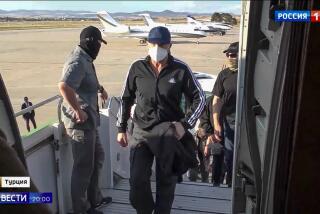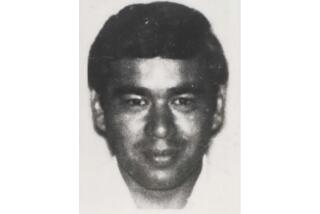The ‘Simple Politics’ of Murder
- Share via
MOSCOW — Fallen apples and yellowed leaves from a tree sheltering the grave of Paul Edward Tatum are the only tributes to the slain American hotelier whose ashes now rest at Kuntsevo Cemetery in a remote Moscow suburb.
Nine months after the 41-year-old Oklahoman was gunned down in an apparent contract killing, his memory and legacy have been virtually erased from the booming capitalist landscape he helped bring into being.
As founder of the first Western-style hotel and business center in Moscow, the brash entrepreneur soared to fame and fleeting fortune and was credited in the early part of this decade with nurturing a consumer consciousness in Russia’s notoriously indifferent service industries.
But Tatum’s slaying, amid a dispute with his Russian partners, and its harrowing implications for other U.S. business-people here have been swept under the carpet by both Washington and Moscow to avoid straining diplomatic relations, his relatives and friends contend.
“Paul was killed because he had the courage to ask the questions all of us want to know the answers to, like why all the property of the Soviet Union ended up in the hands of a small and criminal nomenklatura [elite],” says Natalya Bokadorova, a friend who fought for months--unsuccessfully--to have Tatum buried at the more prestigious Novodevichy Cemetery.
Bokadorova and others believe the late entrepreneur was barred from Novodevichy to deprive him of visibility that might allow him to speak out against corruption from his grave.
The Moscow City Property Committee was Tatum’s partner in the Radisson-Slavyanskaya hotel and, as a result of a complicated tax structure, has acquired the late businessman’s 40% share.
Suspicions immediately fell on Moscow’s city fathers when a gunman fired 20 bullets at Tatum’s back--11 of which struck him--at a busy subway station in November. An investigation continues, but, as with most of the 500-plus contract slayings in Russia last year, no one has been brought to justice.
U.S. government officials likewise recite hollow assurances that the hunt for Tatum’s killer continues.
“We are hopeful it will be resolved successfully,” says U.S. Embassy spokeswoman Olivia Hilton, “and it is our understanding that Russian authorities continue to actively investigate the case.”
But Tatum’s family complains that, for reasons of political expediency, Washington has allowed Moscow to act as though the killing never happened. “It’s simple politics. Weighed in the balance of things, they feel like Paul’s killing doesn’t really matter compared to the risk of damaging relations with the Russians,” says Robin Furmanek, Tatum’s sister in Arizona.
Tatum was fatally shot Nov. 3, after a long battle in which the property committee’s appointees sought to force him out by withholding his share of profits and filing lawsuits.
The International Court for Arbitration in Stockholm ruled in the city’s favor in January that the partnership should be dissolved and that Tatum’s estate should pay the joint venture $2.7 million in claims. But a parallel case seeking the court’s judgment on $8 million Tatum insisted he was owed by the joint venture has yet to be decided.
“If Paul was alive, I know he certainly would pursue it, but Paul was a much stronger personality than the existing shareholders,” says Ray Markovich, Tatum’s Moscow-based American attorney.
Markovich claims that the joint venture clearly owes Tatum millions in profits and incentive fees withheld by the city in the last three years of their acrimonious partnership and that the Stockholm court is likely to rule in his favor.
But unless Tatum’s relatives and former business partners decide to ante up the legal costs of presenting the case in Stockholm, the entrepreneur’s financial legacy could be wiped out as thoroughly as his pioneering reputation.
Friends cling to slim hopes that history will be kinder to Tatum’s memory than have been his contemporaries in these frontier days of post-Communist Russia. “If a monument is ever built to remember the pioneers of the new Russia, Paul’s name will be on it,” says Bokadorova, as she lays a clutch of fake red roses on his barren grave.
More to Read
Sign up for Essential California
The most important California stories and recommendations in your inbox every morning.
You may occasionally receive promotional content from the Los Angeles Times.














